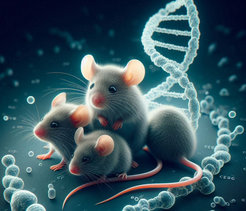No Reason for Concern about Genetic Erosion
Results of a seven-year study by the Max Planck Institute for Evolutionary Biology and the University of Edinburgh offer reassuring perspectives for long-term genetic development.
Researchers from the Max Planck Institute for Evolutionary Biology in Plön and the University of Edinburgh have, for the first time, analyzed the effects of mutation accumulation on various traits, including reproductive fitness, in mammals through a comprehensive study. Over a period of seven years, laboratory mice were examined, whose mutation mechanisms are highly similar to those of humans.

In their project, the researchers conducted a carefully designed mutation accumulation experiment. Starting from genetically identical mouse populations, they bred 55 lines in parallel over 21 generations through controlled sibling pairings. Changes in the animals' traits were meticulously recorded. To ensure that the observed changes were not caused by environmental influences, embryos of the original parent lines were frozen and revived only towards the end of the experiment. This approach made it possible to distinguish the genetic components of the trait changes from those caused by environmental factors.
“This is the first time that control lines have been used in mutation accumulation experiments, which allowed us to differentiate the genetic components of trait changes from environmental ones,” explains Dr. Jobran Chebib, Lecturer at the School of Biological Sciences at the University of Edinburgh.
Theoretical considerations from previous research suggested that a loss of up to five percent in genetic fitness per generation could occur if natural selection were to cease. However, the new study shows that the actual decline in genetic fitness due to the accumulation of harmful mutations is significantly smaller than previously estimated. The researchers estimate that this value is at least ten times lower than earlier predictions. In humans in particular, the likelihood of genetic erosion due to harmful mutations is low, as sibling pairings, like those in the experiment, do not occur.
“Our findings suggest that short-term environmental challenges will pose a greater concern for humanity than long-term genetic changes,” summarize the researchers.
The study provides a solid foundation for assessing potential genetic developments in humans and offers valuable insights into the mechanisms of genetic adaptation. The results are not only reassuring but also highlight the importance of environmental protection and adaptation to changing living conditions.
